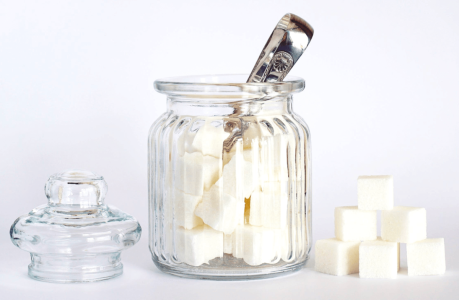Are non-sugar sweeteners hurting your weight loss goals? Find out what the World Health Organisation says!
- Replies 2
If you're trying to lose a little weight, it's natural to turn to things like low-calorie diet soft drinks and diet snacks as a way to reduce your calories. Non-sugar sweeteners (NSS), in particular, are a popular choice with the promise of offering sweetness with no calories attached.
But is this actually helping us reach our weight loss goals? Particularly in the long term? Well, the World Health Organisation (WHO) recently released a new guideline on NSS, and the verdict isn't exactly good news.
According to WHO findings, NSS — such as stevia, splenda, and xylitol — does not produce any measurable long-term benefit when it comes to reducing body fat in adults or children or when it comes to helping control weight or reducing the risk of noncommunicable diseases (NCDs).
In fact, long-term usage of these sweeteners may even have undesirable effects, including an increased risk of type 2 diabetes, cardiovascular diseases, and mortality in adults.

'Replacing free sugars with NSS does not help with weight control in the long term,' said Francesco Branca, WHO Director for Nutrition and Food Safety. 'People need to consider other ways to reduce free sugar intakes, such as consuming food with naturally occurring sugars, like fruit, or unsweetened food and beverages.’
He continued: ‘NSS are not essential dietary factors and have no nutritional value. People should reduce the sweetness of the diet altogether, starting early in life, to improve their health.'
The recommendation applies to all people, except for those with pre-existing diabetes, and includes all synthetic and naturally occurring or modified non-nutritive sweeteners, like acesulfame K, aspartame, advantame, cyclamates, neotame, saccharin, sucralose, stevia, and stevia derivatives.
It does not apply, however, to personal care and hygiene products, like toothpaste and skin cream, that include NSS.
The WHO recommendation is only a conditional assessment, though. This means that, in specific countries, policy decisions related to this recommendation should include a significant discussion that's linked to the extent of consumption in different age groups.
The WHO guideline on NSS is part of a suite of existing and forthcoming guidelines on healthy diets that aim to establish lifelong healthy eating habits, improve dietary quality and decrease the risk of NCDs worldwide.

In a previous article, we discussed the potential safety concerns associated with the sugar substitute erythritol, contrary to what consumers may have believed.
A study published in the journal Nature Medicine revealed a concerning finding: individuals with diabetes who had high levels of erythritol in their blood were found to be twice as likely to experience a heart attack or stroke.
Erythritol is commonly combined with other artificial sweeteners to create low-calorie products that offer more volume. For instance, Splenda stevia sweetener packets often contain a mixture of a small amount of stevia extract and the remainder being erythritol to fill the package.
Erythritol can also be found in various low-calorie foods such as protein bars, low-calorie spreads, and specific peanut butters. Additionally, if you follow a keto diet, be aware that erythritol is present in desserts, antioxidant drinks, and snacks marketed for this lifestyle.
However, it is important to note that there is still ongoing debate and research regarding the actual level of danger posed by erythritol, as indicated in this study. Nevertheless, if you consume a significant amount of low-sugar snacks or beverages containing erythritol, it may be worth considering reducing your intake.
Click here to read the full article.


When it comes to reducing sugar cravings, there are several strategies that may be helpful. Here are a few tips:
Gradually reduce sugar intake: Instead of quitting sugar abruptly, try gradually reducing your intake over time. This can help your taste buds adjust and make the transition easier.
Opt for whole foods: Choose whole, unprocessed foods that are naturally sweet, such as fruit. They provide essential nutrients along with natural sugars, helping satisfy your sweet tooth in a healthier way.
Experiment with spices and flavours: Enhance the taste of your meals and snacks by using spices like cinnamon, nutmeg, or vanilla extract. These can add natural sweetness without the need for excessive sugar.
Stay hydrated: Sometimes, thirst can be mistaken for sugar cravings. Ensure you're drinking enough water throughout the day to stay properly hydrated.
Choose healthy snacks: Instead of reaching for sugary treats, opt for nutritious snacks like nuts, seeds, or vegetables with hummus. These options can provide a satisfying crunch or savoury flavour.
Get enough sleep: Lack of sleep can contribute to increased sugar cravings. Prioritise a good night's sleep to help maintain a balanced appetite and reduce the desire for sugary foods.
Remember, everyone's journey to reducing sugar intake is unique. What works for one person may not work for another. It's important to find strategies that suit your preferences and lifestyle. If you're looking for more tips or advice, consider discussing with a registered dietitian or nutritionist who can provide personalised guidance tailored to your specific needs.
We'd love to hear your thoughts on this! Have you ever taken the plunge and removed sugar and its alternatives from your diet? Share your experiences with us! And if you have any additional tips or tricks up your sleeve, don't hold back - we're all ears! Drop your comments below and join the conversation!
But is this actually helping us reach our weight loss goals? Particularly in the long term? Well, the World Health Organisation (WHO) recently released a new guideline on NSS, and the verdict isn't exactly good news.
According to WHO findings, NSS — such as stevia, splenda, and xylitol — does not produce any measurable long-term benefit when it comes to reducing body fat in adults or children or when it comes to helping control weight or reducing the risk of noncommunicable diseases (NCDs).
In fact, long-term usage of these sweeteners may even have undesirable effects, including an increased risk of type 2 diabetes, cardiovascular diseases, and mortality in adults.

According to new World Health Organization guidance, using non-sugar sweeteners like sucralose and stevia might cause more harm than good. Credit: Pexels/Suzy Hazelwood.
'Replacing free sugars with NSS does not help with weight control in the long term,' said Francesco Branca, WHO Director for Nutrition and Food Safety. 'People need to consider other ways to reduce free sugar intakes, such as consuming food with naturally occurring sugars, like fruit, or unsweetened food and beverages.’
He continued: ‘NSS are not essential dietary factors and have no nutritional value. People should reduce the sweetness of the diet altogether, starting early in life, to improve their health.'
The recommendation applies to all people, except for those with pre-existing diabetes, and includes all synthetic and naturally occurring or modified non-nutritive sweeteners, like acesulfame K, aspartame, advantame, cyclamates, neotame, saccharin, sucralose, stevia, and stevia derivatives.
It does not apply, however, to personal care and hygiene products, like toothpaste and skin cream, that include NSS.
The WHO recommendation is only a conditional assessment, though. This means that, in specific countries, policy decisions related to this recommendation should include a significant discussion that's linked to the extent of consumption in different age groups.
The WHO guideline on NSS is part of a suite of existing and forthcoming guidelines on healthy diets that aim to establish lifelong healthy eating habits, improve dietary quality and decrease the risk of NCDs worldwide.

A new study has revealed something concerning about a commonly used sugar alternative called erythritol. Credit: Unsplash/Alexander Grey.
In a previous article, we discussed the potential safety concerns associated with the sugar substitute erythritol, contrary to what consumers may have believed.
A study published in the journal Nature Medicine revealed a concerning finding: individuals with diabetes who had high levels of erythritol in their blood were found to be twice as likely to experience a heart attack or stroke.
Erythritol is commonly combined with other artificial sweeteners to create low-calorie products that offer more volume. For instance, Splenda stevia sweetener packets often contain a mixture of a small amount of stevia extract and the remainder being erythritol to fill the package.
Erythritol can also be found in various low-calorie foods such as protein bars, low-calorie spreads, and specific peanut butters. Additionally, if you follow a keto diet, be aware that erythritol is present in desserts, antioxidant drinks, and snacks marketed for this lifestyle.
However, it is important to note that there is still ongoing debate and research regarding the actual level of danger posed by erythritol, as indicated in this study. Nevertheless, if you consume a significant amount of low-sugar snacks or beverages containing erythritol, it may be worth considering reducing your intake.
Click here to read the full article.
Key Takeaways
- The WHO has released a new guideline on non-sugar sweeteners (NSS), stating that they do not offer measurable long-term benefits in terms of weight control, reducing body fat or lowering the risk of noncommunicable diseases.
- Long-term use of NSS may even have undesirable effects such as an increased risk of type 2 diabetes, cardiovascular diseases and mortality in adults.
- To promote overall health and well-being, the WHO recommends reducing the overall sweetness in one's diet and considering alternative ways to reduce free sugar intake such as consuming naturally occurring sugars found in fruits or unsweetened food and beverages.

By opting for lower sugar options, you can make sure you're eating a healthy diet. Credit: Unsplash/Brooke Lark.
When it comes to reducing sugar cravings, there are several strategies that may be helpful. Here are a few tips:
Gradually reduce sugar intake: Instead of quitting sugar abruptly, try gradually reducing your intake over time. This can help your taste buds adjust and make the transition easier.
Opt for whole foods: Choose whole, unprocessed foods that are naturally sweet, such as fruit. They provide essential nutrients along with natural sugars, helping satisfy your sweet tooth in a healthier way.
Experiment with spices and flavours: Enhance the taste of your meals and snacks by using spices like cinnamon, nutmeg, or vanilla extract. These can add natural sweetness without the need for excessive sugar.
Stay hydrated: Sometimes, thirst can be mistaken for sugar cravings. Ensure you're drinking enough water throughout the day to stay properly hydrated.
Choose healthy snacks: Instead of reaching for sugary treats, opt for nutritious snacks like nuts, seeds, or vegetables with hummus. These options can provide a satisfying crunch or savoury flavour.
Get enough sleep: Lack of sleep can contribute to increased sugar cravings. Prioritise a good night's sleep to help maintain a balanced appetite and reduce the desire for sugary foods.
Remember, everyone's journey to reducing sugar intake is unique. What works for one person may not work for another. It's important to find strategies that suit your preferences and lifestyle. If you're looking for more tips or advice, consider discussing with a registered dietitian or nutritionist who can provide personalised guidance tailored to your specific needs.
We'd love to hear your thoughts on this! Have you ever taken the plunge and removed sugar and its alternatives from your diet? Share your experiences with us! And if you have any additional tips or tricks up your sleeve, don't hold back - we're all ears! Drop your comments below and join the conversation!







